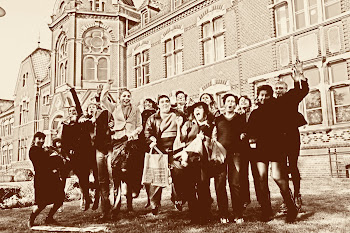Short
Dissertation Abstract (2013):
Theory and practice are mutually dependent in the relation
of thinking and living, which is the fabric of daily life. The current global
administration of resources relies on isolating practice and critical thought
from one another, disempowering both thinking and living in the process.
Despite increasing doubt, languages help us wage nonviolent resistance against
the global system of exploitation in the 21st century. These are
languages of resistance: forging solidarity that subverts corporatist reality
in a sustainable movement of nonviolence.
Languages of
Resistance is an attempt not only to intervene in debates about
the urgency of thinking in action among activists and academics, theorists and
revolutionaries, laymen and professionals, but also to indicate that this
intervention cannot be sufficient by itself: thereby it constitutes a call to
act. What this doing, not limited to text, looks like is not a question of
prescription. The call articulated here is concretely situated in various
chapters: just outside Ivory tower doors, in occupied spaces, echoing different
voices, inviting others who may be unrecognized at all by the spaces they and
we need to live.
Through a performative approach, Language of Resistance shows that global resistance requires
nonviolent subversion of dichotomies, where languages, thought and action come
together. “Teaching without Masters” opens a dialogue around the productive
tension between Judith Butler’s performativity and Audre Lorde’s critique of
the master’s tools, evoking the proliferation of a performative mode of
teaching and learning to undermine intersecting modes of domination.
“Nonviolence Now” traces the transformation of nonviolent movements between the
20th and 21st centuries, subverting the dichotomy of
violence and nonviolence to strengthen resistance movements against cooptation.
“Wooden Constellations” elaborates a performative method of undermining
division without homogenization, where theory and practice are mutually
dependent. “Undoing Gewalt” examines
the current dangers and interconnections of violence in its various forms, from
discursive to institutional and state violence. “Translation and the Hope of
Language” addresses an approach to language guided out of itself by hope. “Doing
Language” calls on active resistance and (cultural/political) translation to
sustain a nonviolent movement against domination.
These concerns follow a reading of a controversial
trajectory of nonviolence in the works of Judith Butler and their encounter
with Walter Benjamin’s thinking. Productive historical tensions and concrete
intersections are addressed in this emerging tradition.

